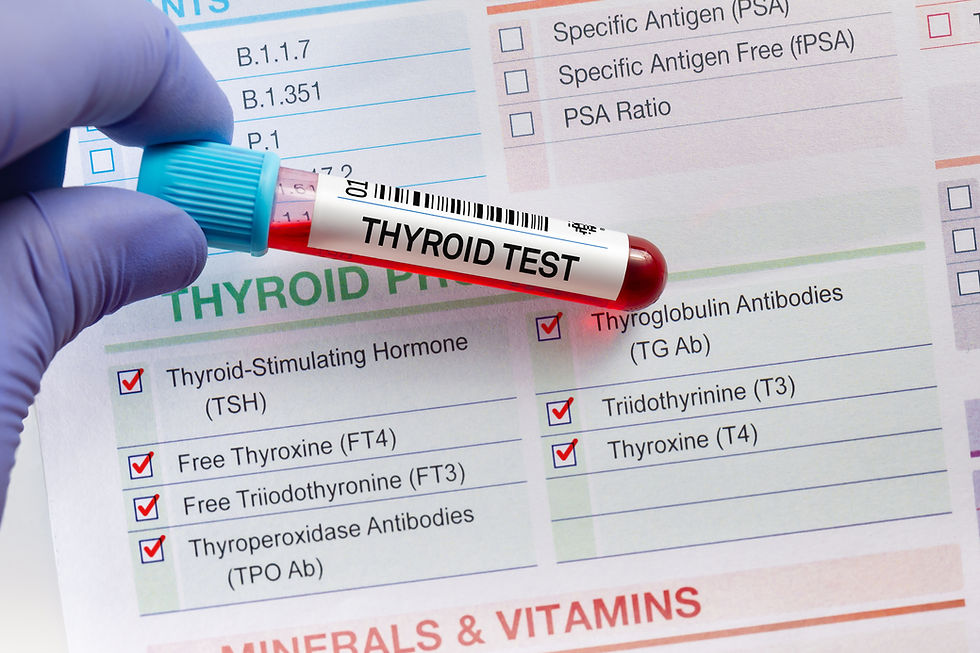Thyroid Markers, Why Is It Important To Get All Of Them Checked?
- Joyce Knieff, ND, LAc

- Nov 16, 2022
- 3 min read
Are you feeling tired, sluggish, dried out, cold, bloated, and even depressed? You’ve been told you’re just getting old, but you aren’t satisfied with the answer.
This is a classic presentation of underactive thyroid. Even if you seem to tick all the boxes, you may have been told that your thyroid tests came back “normal,” so there’s nothing to worry about. But why do you have all the symptoms? Let’s look at the different thyroid hormones and why it’s essential to test them all.
Thyroid Stimulating Hormone – The Standard Hormone Test
Many people with “normal” test results only had their levels of thyroid stimulating hormone (TSH)tested. Your pituitary gland, sitting deep in your brain, produces this hormone to increase the function of the thyroid gland. High TSH indicates an underactive thyroid in need of more stimulation, while low TSH indicates an attempt to calm an overactive thyroid.
You may notice how one-dimensional this all sounds, and it is.
Why You Need Your True Thyroid Hormones Tested

Your thyroid hormones are known as T4 and T3. TSH first triggers the production of T4, which is then turned into the active T3. Think lighting fireworks: the potential is there, but only lit fireworks (T3) can put on a show. A range of factors can affect any of these steps, so even the best TSH levels don’t necessarily mean your thyroid is doing well.
One example of this is Euthyroid Sick Syndrome, a condition seen under severe physical or
psychological stress. Levels of T3 are usually low, while TSH and T4 are in their normal ranges. This leads to symptoms of an underactive thyroid. Inflammation, such as that caused by inflammatory bowel disease, intense stress, and severe infection, are common contributors. Here, you can think of it as being unable to buy enough lighter fluid or matches for your fireworks show.
Don’t Underestimate Reverse T3
Reverse T3 is a lesser-known, often underestimated hormone that can create symptoms of an
underactive thyroid. Your levels of TSH and T4 may be normal in this case, too.
Reverse T3 is produced from T4 and weakly attaches to the thyroid hormone receptors intended for T3. Although this weak attachment takes up space, it does not function like regular T3. High reverseT3 also indicates lower T3 production. Back to the fireworks analogy, you can’t light all of the rockets needed for your show because many are duds! All they do is take up space.
What About Thyroid Antibodies?
A full thyroid panel should include your thyroid antibodies. Your immune system makes antibodies to fight off threats under normal circumstances. In autoimmune conditions, they are made against your own tissues as immune cells become confused. This leads to dysfunction and destruction in the target tissue, which can be either an overactive (Grave’s disease) or underactive (Hashimoto’s disease) thyroid.
It is possible to have normal TSH levels and higher thyroid antibodies in a very early or low-grade immune response. If you are pregnant, trying to conceive, or have a family history of autoimmune diseases, antibody testing is essential for early treatment.
Where To Next?
You’re tired of being tired and overlooked, so where to next? Your first step is finding a holistically-minded primary care physician, which our Direct Care Program can provide. If you’re experiencing thyroid issues, it’s best to order a full thyroid panel as soon as possible to reduce the effect of any potential condition on your thyroid and overall health. These can be treated with a combination of natural and conventional medicine, optimized to best support your body as a whole system.
References
Ganesan K, Wadud K. Euthyroid Sick Syndrome. [Updated 2021 Oct 30]. In: StatPearls [Internet].Treasure Island (FL): StatPearls Publishing; 2022 Jan-. Available from:
https://www.ncbi.nlm.nih.gov/books/NBK482219/
Halsall, David J, and Susan Oddy. “Clinical and laboratory aspects of 3,3',5'-triiodothyronine (reverseT3).” Annals of clinical biochemistry vol. 58,1 (2021): 29-37. doi:10.1177/0004563220969150
Prummel, Mark F, and Wilmar M Wiersinga. “Thyroid peroxidase autoantibodies in euthyroid subjects.” Best practice & research. Clinical endocrinology & metabolism vol. 19,1 (2005): 1-15.doi:10.1016/j.beem.2004.11.003





Comments